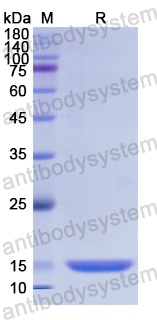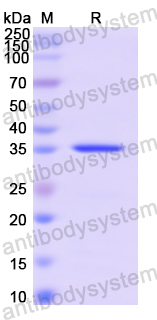Catalog No.
RHJ35604
Species reactivity
Human
Host species
Mouse
Isotype
IgG1
Clonality
Monoclonal
Tested applications
WB: 1:500-1:2000
Target
Ubiquitin-specific-processing protease 7, Deubiquitinating enzyme 7, Ubiquitin thioesterase 7, USP7, Herpesvirus-associated ubiquitin-specific protease, HAUSP, Ubiquitin carboxyl-terminal hydrolase 7
Concentration
1 mg/ml
Endotoxin level
Please contact with the lab for this information.
Purity
>95% as determined by SDS-PAGE.
Purification
Protein A/G purified from cell culture supernatant.
Accession
Q93009
Applications
WB
Form
Liquid
Storage buffer
0.01M PBS, pH 7.4, 0.05% Sodium Azide.
Stability and Storage
Use a manual defrost freezer and avoid repeated freeze-thaw cycles. Store at 4°C short term (1-2 weeks). Store at -20°C 12 months. Store at -80°C long term.
Clone ID
R3V68
USP7 accelerates colorectal cancer progression by up-regulating MYO6 through deubiquitination., PMID:40446734
Selective USP7 Inhibition Synergizes with MEK1/2 Inhibitor to Enhance Immune Responses and Potentiate Anti-PD-1 Therapy in NRAS-Mutant Melanoma., PMID:40204067
USP7 promotes IgA class switching through stabilizing RUNX3 for germline transcription activation., PMID:38735043
Cellular Assays for Dynamic Quantification of Deubiquitinase Activity and Inhibition., PMID:37858708
Isorhamnetin and anti-PD-L1 antibody dual-functional mesoporous silica nanoparticles improve tumor immune microenvironment and inhibit YY1-mediated tumor progression., PMID:37408047
ANXA1-derived peptide for targeting PD-L1 degradation inhibits tumor immune evasion in multiple cancers., PMID:37001908
A Designer Nanoparticle Platform for Controlled Intracellular Delivery of Bioactive Macromolecules: Inhibition of Ubiquitin-Specific Protease 7 in Breast Cancer Cells., PMID:35796308
Evaluation of In Vitro Tools to Predict the In Vivo Absorption of Biopharmaceuticals Following Subcutaneous Administration., PMID:35429492
Acetylated DNMT1 Downregulation and Related Regulatory Factors Influence Metastatic Melanoma Patients Survival., PMID:34572918
A ubiquitin switch controls autocatalytic inactivation of the DNA-protein crosslink repair protease SPRTN., PMID:33348378
Pharmacological inhibition of USP7 promotes antitumor immunity and contributes to colon cancer therapy., PMID:30697058
Genome-wide discovery of somatic coding and noncoding mutations in pediatric endemic and sporadic Burkitt lymphoma., PMID:30617194
Prospero-related homeobox 1 drives angiogenesis of hepatocellular carcinoma through selectively activating interleukin-8 expression., PMID:28646551
Ubiquitin-specific Protease-7 Inhibition Impairs Tip60-dependent Foxp3+ T-regulatory Cell Function and Promotes Antitumor Immunity., PMID:27769803
STIP is a critical nuclear scaffolding protein linking USP7 to p53-Mdm2 pathway regulation., PMID:26460617
The Deubiquitinating Enzyme USP7 Regulates Androgen Receptor Activity by Modulating Its Binding to Chromatin., PMID:26175158
FBXW7 and USP7 regulate CCDC6 turnover during the cell cycle and affect cancer drugs susceptibility in NSCLC., PMID:25885523
Lung neuroendocrine tumors: correlation of ubiquitinylation and sumoylation with nucleo-cytosolic partitioning of PTEN., PMID:25884169
Annexin-1 regulated by HAUSP is essential for UV-induced damage response., PMID:25695607
A survey of the interactome of Kaposi's sarcoma-associated herpesvirus ORF45 revealed its binding to viral ORF33 and cellular USP7, resulting in stabilization of ORF33 that is required for production of progeny viruses., PMID:25694600
Genome-wide association study of antibody level response to NDV and IBV in Jinghai yellow chicken based on SLAF-seq technology., PMID:25588649
Quantitative Lys-ϵ-Gly-Gly (diGly) proteomics coupled with inducible RNAi reveals ubiquitin-mediated proteolysis of DNA damage-inducible transcript 4 (DDIT4) by the E3 ligase HUWE1., PMID:25147182
BCR-ABL disrupts PTEN nuclear-cytoplasmic shuttling through phosphorylation-dependent activation of HAUSP., PMID:24317448
Overexpression of the ubiquitin-specific protease 7 resulting from transfection or mutations in the ICP0 binding site accelerates rather than depresses herpes simplex virus 1 gene expression., PMID:22993145
M phase phosphorylation of the epigenetic regulator UHRF1 regulates its physical association with the deubiquitylase USP7 and stability., PMID:22411829
Activity-based chemical proteomics accelerates inhibitor development for deubiquitylating enzymes., PMID:22118674
Affinity purification strategy to capture human endogenous proteasome complexes diversity and to identify proteasome-interacting proteins., PMID:19193609



